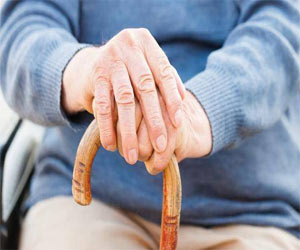- Home
- Editorial
- News
- Practice Guidelines
- Anesthesiology Guidelines
- Cancer Guidelines
- Cardiac Sciences Guidelines
- Critical Care Guidelines
- Dentistry Guidelines
- Dermatology Guidelines
- Diabetes and Endo Guidelines
- Diagnostics Guidelines
- ENT Guidelines
- Featured Practice Guidelines
- Gastroenterology Guidelines
- Geriatrics Guidelines
- Medicine Guidelines
- Nephrology Guidelines
- Neurosciences Guidelines
- Obs and Gynae Guidelines
- Ophthalmology Guidelines
- Orthopaedics Guidelines
- Paediatrics Guidelines
- Psychiatry Guidelines
- Pulmonology Guidelines
- Radiology Guidelines
- Surgery Guidelines
- Urology Guidelines
Diabetics with raised blood sugar have higher risk of frailty later in life

Delhi: People with overt diabetes or raised HbA1c or fasting blood sugar levels have a higher risk of frailty throughout later life. Non-frail diabetes patients or those having high blood sugar levels also experienced a more rapid deterioration of frailty with age.
These are the results of a recent 10 year-long study published in the Diabetes Care journal. These results imply the role of diabetes complications in frailty trajectories or earlier shared determinants that contribute to diabetes and frailty risk in later life.
Earlier studies have found that higher blood sugar levels may be a risk factor for frailty in older adults without diabetes.Frailty is a dynamic state of vulnerability in the elderly. Gloria A. Aguayo, Population Health Department, Luxembourg Institute of Health, Strassen, Luxembourg, and colleagues evaluated an association among diabetes, blood sugar control, and frailty in the participants from the English Longitudinal Study of Ageing.
The study involved 5377 participants in whom diabetes, HbA1c, and FG were assessed at baseline, and frailty status was evaluated with a 36-item frailty index every 2 years during a 10-year follow-up. Mixed-effects models with age as time scale were used to assess whether age trajectories of frailty differed as a function of diabetes, HbA1c, and FG.
Also Read: Diabetes increases risk of fractures in those who are frail, finds study
Key findings include:
- Among 5,377 participants (median age [interquartile range] 70 [65, 77] years, 45% men), 35% were frail at baseline.
- In a model adjusted for sex, participants with baseline diabetes had an increased frailty index over aging compared with those without diabetes. Similar findings were observed with higher levels of HbA1c, while FG was not associated with frailty.
- In a model additionally adjusted for income, social class, smoking, alcohol, and hemoglobin, only diabetes was associated with an increased frailty index.
- Among nonfrail participants at baseline, both diabetes and HbA1c level were associated with a higher increased frailty index over time.
Also Read: Indian Doctors release Guidelines for management of Diabetes during Fasting in JAPI, Details
"The findings underscore the importance of recognizing diabetes and poor glycemic control as independent risk factors for frailty. With aging of the population worldwide, recognizing frailty and the resulting decrease in functionality in this population with diabetes is important. Clinicians should be aware of assessment methods to detect these conditions, which should be used in routine clinical care of older adults. Once detected, the management strategies should include interventions such as exercise, as tolerated, and adequate nutrition, especially adequate protein intake in order to prevent sarcopenia," write the authors.
To read the study in detail log on to https://doi.org/10.2337/dc19-0497

Disclaimer: This site is primarily intended for healthcare professionals. Any content/information on this website does not replace the advice of medical and/or health professionals and should not be construed as medical/diagnostic advice/endorsement or prescription. Use of this site is subject to our terms of use, privacy policy, advertisement policy. © 2020 Minerva Medical Treatment Pvt Ltd